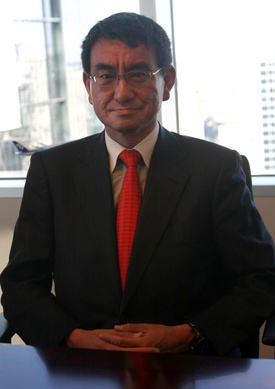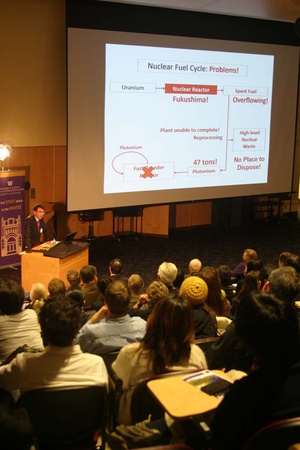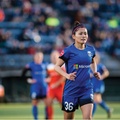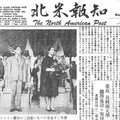Taro Kono, a member of the House of Representatives, visited the area as a lecturer for the Mitsubishi Corporation Special Lecture Series. During his visit, he also had talks with local Japanese-Americans with whom he has developed close ties. He has had a long history of interaction with the Japanese American community in the United States, and in the Japanese American Leadership Delegation (JALD), which began in 2000 with the aim of building bridges between Japanese American leaders and Japan, he has played the role of host on the Japanese side and deepened his interactions with the participants. We spoke to him about his long-standing interactions with Japanese-Americans.
* * * * *
How did the friendship between Senator Kono and Japanese Americans begin?
I first came to the United States when I was in the first year of junior high school, and I stayed there for the summer with a professor from my father's time at Stanford University. On my way back from there, I stopped off at a Japanese restaurant in Los Angeles called Yamato, where I was often looked after by a Japanese couple named Ishizaki.
Although he is Japanese, he doesn't speak much Japanese. As I listened to his various stories, I learned about the history of Japanese Americans. As I listened to stories about internment during the war and Japanese Americans active in Los Angeles, I felt proud and interested in some things I had never heard before.
After he became a member of the Diet, former Vice-Minister for Foreign Affairs Masaharu Kono became Consul General in Los Angeles, and he and my father talked about the idea of continuing the current JALD program, and that's when they approached me.
Every year, I would have dinner with JALD members (in Tokyo) and go to karaoke, and then they would invite me to the Nisei Parade in Los Angeles. I also try to attend the U.S.-Japan Council (USJC) annual meeting whenever possible. That's how I began to interact with them.
This year, a delegation of 10 people will be heading to Japan.
We are planning to have a dinner party on March 12th. It will be a gathering of members from here and members of the Japanese Diet.
About interactions with Japanese people outside of North America.
The Japanese communities in Latin America are large, but to be honest, it's difficult to have exchanges like JALD. I've been involved a lot in providing administrative services to Japanese people in Latin America who work in Japan on Japanese visas and cannot communicate in Japanese, but so far the only place I've been able to interact with Japanese leaders in each region of the country is the United States.
Is attitudes towards Japanese people in the Diet changing?
I think the younger generation is becoming more aware of this. Rather than being about which prefecture immigrants come from, for example, they are the easiest point of contact when it comes to relations between the United States and Japan.
Now that you have lost a major pillar in the United States in the form of Senator Daniel Inouye, what position do you find yourself in in terms of gaining understanding for Japan in the United States?
At the general meeting in Seattle, we decided to have exchanges between USJC, Japanese American politicians, and Japanese politicians, and I visited Los Angeles as part of that, but I am a little worried that USJC has not been very enthusiastic about political exchanges recently. Colleen Hanabusa lost the primary election in the Senate last year. Hawaii still has Senator Mazie Hirono in the Senate, and California still has Senator Mark Takano and others in the House of Representatives, but the numbers are becoming limited, and I am a little worried about that. The number of state legislators is increasing slightly in some places, so I would like to have a strong exchange.
Last November, local assembly members visited Japan as part of a USJC program.
I am very sorry that I was not able to meet you at all due to the dissolution of the Diet and the general election. I knew you were coming, and I had some acquaintances there, so we had planned to meet in Tokyo. It was a great shame, and I hope to continue meeting you regularly from now on.
What is your impression of Senator Daniel Inouye?
When I was first elected in 1996, I have the impression that Senator Inouye did not talk much about U.S.-Japan relations. I think that even if he stopped by the Okinawa base, he would return home without stopping by Tokyo.
One time, when the three of us were having dinner together, my father and I talked about many things. He said, "When a Japanese-American politician named Daniel Inouye speaks about Japan-U.S. relations, no one will think that it's a Japanese-American speaking. That's how confident he has become."
Daniel Inouye has established a strong position in the Senate and is respected, so when he speaks, he is speaking as the "conscience of America," and not as a "Japanese person." He said that he began to speak a little in Tokyo because he felt that everyone had come to think that way.
Prime Minister Abe is scheduled to visit the United States at the end of April. On the 70th anniversary of the end of the war, where would you like to visit?
When Foreign Minister Kishida visited Los Angeles in 2013, I told the Ministry of Foreign Affairs and myself, "Please go to Los Angeles. It's not good for everyone to skip the West Coast and go to Washington DC and New York." After the Foreign Minister returned to Japan, he told me, "I'm glad I went." It had been a really long time since the Foreign Minister had visited, and we decided that this was not good.
If he is going to visit Washington DC, I think it would be better to stop by Hawaii, Los Angeles, San Francisco, Seattle or somewhere else to meet the Japanese American community and have them tell him that "Japan-U.S. relations are important, and Japanese Americans are important," before heading to the East Coast. Foreign Minister Kishida has also spoken to the Prime Minister, so I think he will come to the West Coast this time.
When he returned from Rio de Janeiro, where the Tokyo Olympics (for 2020) were decided, (Prime Minister Abe) actually arrived in Los Angeles in the middle of the night. Since it was the middle of the night, he took a short break and then left for Japan. However, there were many people there who helped with the decision to host the Tokyo Olympics in 1964, and many Japanese people who have strong feelings for the city, so I think that if the Prime Minister could greet them even in the middle of the night, they would have been happy. If possible, Hawaii. Also, if he chooses Los Angeles, people will ask what about San Francisco, but I think it is important for him to visit all of the cities if possible.
Also, the Japanese Prime Minister has yet to visit Pearl Harbor. As it is the 70th anniversary of the end of the war, I think it is important that the Japanese Prime Minister visits Pearl Harbor first and then asks President Obama to visit Hiroshima or Nagasaki. At the G8 summit in Hiroshima in 2008, Speaker Nancy Pelosi came and all the speakers gathered. The Speaker came to Hiroshima, so it's up to the Vice President or the President.
In your previous blog post, you mentioned that we should rebuild our relationship with Japanese people. Do you have any suggestions for that?
Before I started JALD (Japanese American Leadership Delegation), I honestly thought that Japanese people were not very interested in Japan. When I talked to various Japanese people, many of them could not speak Japanese. I have always thought that it would be good if they were interested in Japan, since they have Japanese blood in their veins. Also, Japanese people are among the most likely to not marry someone of the same race. However, I think that this is a good thing in terms of spreading Japanese blood. I think it is important to reach out more and more.
One JALD member visited his ancestors' graves and saw the rows of graves spanning about five generations. He said, "I felt like I was Japanese," and became such a fan of Japan that he became a completely different person before and after seeing the graves. The good thing about JALD is that it allows people to actually go to Japan and see it, and feel connected to Japan. Not only do many people not speak Japanese, but many have never been there, so it's important that they actually come and think, "Japan is a great place."
Among Japanese-American lawmakers, there are those like Mr. Inouye and those like Congressman Mike Honda who are critical of Japan, but I think it's important that there are a variety of people and that they voice a variety of opinions about Japan.
Rather than saying that it has nothing to do with anything, I think it's important that people tell us what they notice, even if it's something critical.
*This article is reprinted from the February 5th and 12th, 2015 edition of the North American Post (Vol. 70, issues 7 and 8).
© 2015 The North American Post







